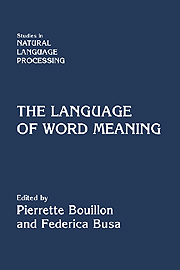Introduction: Word Meaning and Creativity
Published online by Cambridge University Press: 07 October 2011
Summary
Utterers create meanings by using words in context.
Hearers create interpretations.
Patrick Hanks, SPARKLE Workshop, Pisa, January 1999.This quote from Patrick Hanks reflects very closely the spirit of this volume that tackles the relation between word meaning and human linguistic creativity. We are interested in pursuing the view that words are rich repositories of semantic information that people use to talk about the world in a potentially infinite number of ways. Our goal is to tackle the essence of words insofar as they provide a window onto human cognition and the compositional nature of thought. It is thus imperative that a theory of language addresses how lexical items contribute to the peculiar human ability that goes under the label of “linguistic creativity.”
It is undeniable that words have “meanings” that go above and beyond the scope of linguistic research: They often carry the weight of a person's own experience. We are not aiming at exploring the unexplorable, but in proving that, given an appropriate set of methodological tools, a formal modeling of word meaning and linguistic creativity can be achieved. Linguistic creativity is a “generative” ability to extend the expressive possibilities of language in a potentially infinite number of ways. From the perspective of the lexicon (i.e., word meaning), it is the ability to give new meanings to words beyond their literal use.
As such, the overall task follows the strategy of contemporary generative syntax, which has achieved a basic understanding of how speakers produce and understand novel utterances and has brought simplicity to the great complexity underlying the syntactic structure of sentences.
- Type
- Chapter
- Information
- The Language of Word Meaning , pp. xiii - xviPublisher: Cambridge University PressPrint publication year: 2001

